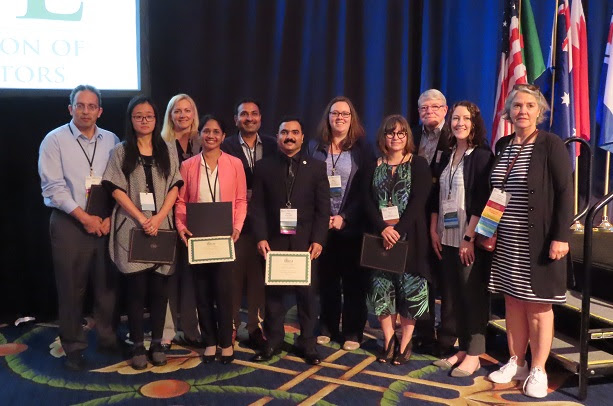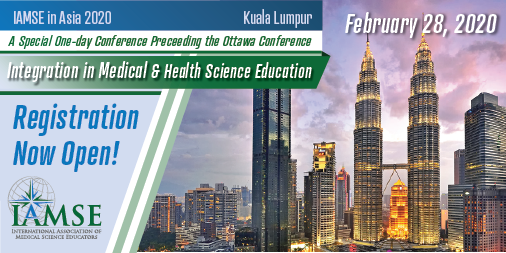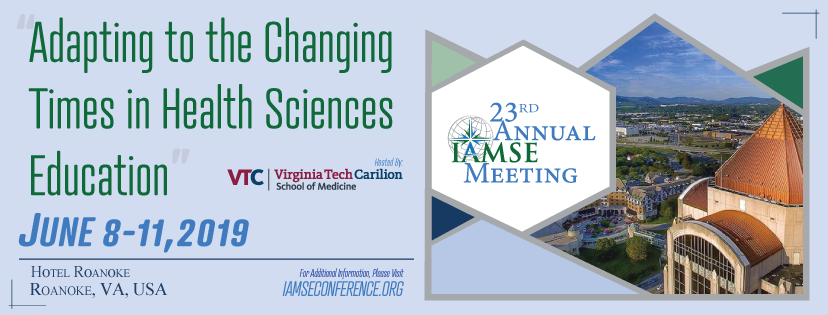News
We can’t wait to see you in Malaysia!
We are pleased to extend your company an invitation to be an exhibitor at the International Association of Medical Science Educators’ (IAMSE) one-day IAMSE conference to be held in conjunction with the 2020 Ottawa Conference in Kuala Lumpur, Malaysia on February 28, 2020.
The IAMSE conference explores strategies for teaching, learning and student assessment and brings faculty, staff, and students from around the world who are interested in medical science education together. The conference offers opportunities for faculty development in focus sessions, oral and poster presentations, and networking opportunities.
For more information on exhibiting, please see our exhibitor brochure for pricing and details or please contact the IAMSE office at support@iamse.org or by phone at +1 (304) 522-1270. Sponsorship opportunities are also available.
Thank you for supporting IAMSE and we look forward to seeing you in Kuala Lumpur!
Sincerely,
Julie K. Hewett, CMP, CAE
IAMSE Association Manager
Congratulations to the 2019 IAMSE Student Educational Grant Winners
The International Association of Medical Science Educators (IAMSE) wishes to encourage and support scholarship in medical science education and funds multiple research grants every year. At the 2019 annual meeting, IAMSE, with the support of ScholarRX, awarded four student grants totaling $8,975.
Student Awards
Nicholas Ingram
MedAchieve: Examining the educational outcomes of a medical school mentorship program
Lindsey Leggett
Determining the Best Strategy to Integrate Clinical Nutrition and Culinary Medicine for Preventative
Austin McHenry
3D Printing of Human Organs for Gross Pathology Medical Education
Callie Torres
An Investigation on The Impact of Resource Overutilization on Medical Student Burnout
Congratulations to this year’s grant award winners. We are eager to see and hear about your findings. More information regarding IAMSE Educational Grants, including information on submitting yourself for consideration, can be found on our website.
Thank you,
Chris Burns
IAMSE Student Professional Development Committee
*Reminder* #IAMSE20ASIA in Kuala Lumpur Call for Posters and Orals Due September 15
The International Association of Medical Science Educators (IAMSE) would like to remind you that abstracts for Oral and Poster presentations are still be accepted for the one-day IAMSE conference in Asia, on February 28, 2020. This conference will focus on “Integration in Medical and Health Science Education” and will take place in the internationally recognized Shangri-La Hotel in Kuala Lumpur, Malaysia. The meeting immediately precedes the international Ottawa Conference on assessment, also held in Kuala Lumpur. With the one-day IAMSE conference we specifically reach out to participants from the Asia-Pacific region, but of course, we also welcome participants from other parts of the world to join us. The IAMSE meeting offers opportunities for faculty development and networking, bringing together medical sciences and medical education across the continuum of health care education.
Please click here to submit your abstract today.
Submission deadline is September 15, 2019. There is no limit on the number of abstracts you may submit, but in the case of scheduling conflicts only presentations per presenter might be granted. Abstract acceptance notifications will be returned by November 15, 2019.
Congratulations to the #IAMSE19 Finnerty Award Winner Gary Rosenfeld, PhD
On behalf of the Board of Directors, I’d like to congratulate Gary Rosenfeld on receiving the Edward Patrick Finnerty Lifetime Achievement Award at the 23rd Annual IAMSE Meeting in June.

IAMSE President Richard Vari and 2019 Edward Patrick Finnerty
Lifetime Achievement Award Winner Gary Rosenfeld
Edward Patrick Finnerty Lifetime Achievement Award
This award is bestowed upon an individual member who has demonstrated a sustained involvement in and commitment to the advancement of the International Association of Medical Science Educators through their many types of service to the organization at the maximal level of performance.
The special nature of this award makes it one for which a member may not apply, but rather, it represents the superlative level of recognition that the organization, through the selection by its Board of Directors, can provide to a most worthy individual whose work on behalf of IAMSE has shown a consistent history of distinguished accomplishments.
It is with sincere appreciation and gratitude to his continued efforts and outstanding support that we bestow this award to our dear friend and colleague, Gary Rosenfeld. Congratulations, and thank you for all that you do for IAMSE.
Thank you,
Richard Vari
President, IAMSE
Congratulations to the 2019 IAMSE Outstanding Reviewer Nagaswami Vasan
Nagaswami Vasan received the International Association of Medical Science Educators (IAMSE) 2019 Outstanding Reviewer Award during the Association’s annual meeting in Roanoke, Virginia (USA).
This award is an initiative of the Editorial Board of Medical Science Educator, the peer-reviewed journal of IAMSE. The award is presented annually to recognize one of the journal’s reviewers for his/her outstanding peer review efforts over the past year. The recipients are selected based on several criteria including reviewer performance and delivering the reviews in a timely manner. Congratulations Dr. Vasan!
Thank you,
Peter de Jong
Editor-in-Chief, Medical Science Educator
IAMSE Administrative Office Closed for July 4th
In observance of the Independence Day holiday in the United States, the IAMSE Administrative offices will be closed on Thursday, July 4. We will resume normal hours on Friday, July 5.

Congratulations to the 2019 Medical Educator Fellowship Recipients
On behalf of the Educational Scholarship Committee, we’d like to congratulate those who have completed this year’s IAMSE Medical Educator Fellowship Program.
The Fellowship program is designed to develop well-rounded medical education scholars with additional evidence of specialized achievement that enhances and supports career advancement.
The program is divided into three phases:
- Completion of an AMEE Essential Skills in Medical Education (ESME) program
- Completion of two, day-long faculty development courses
- Completion of a project which results in educational scholarship and demonstrates the application of content themes at the participant’s home institution

IAMSE Medical Educator Fellows Class of 2019 Medical Educator Fellows Completing the Fellowship in 2019
- Sateesh Babu Arja
- Sireesha Bala Arja
- Khalil Mohamed Eldeeb
- Carrie A. Elzie
- Arundathi Jayatilleke
- Elizabeth K. McClain
- Mary E. Steinmann
- Praveen Kottath Veetil
- Lu Xu
Thank you,
Amber Heck
Chair, Educational Scholarship Committee
Last Call for #IAMSE20 in Denver Pre-Conference Workshops Abstracts Due July 1

Don’t miss your last chance to submit an abstract for a Pre-Conference Workshop or Faculty Development Course for the 24th IAMSE Annual Meeting. This meeting will take place in Denver CO, USA, from June 13-16 2020. As a reminder, proposals are to be submitted in the format requested through the online proposal submission site. Deadline for submission of abstracts is July 1, 2019.
As a reminder, the focus of these workshops should include:
• Leadership/Advancement as a Medical Educator
• Research/Scholarship/Publications
• Instruction/Assessment
• Technology
We offer two options for these courses: six-hour faculty development courses and three-hour pre-conference workshops.
Pre-Conference Faculty Development Course
A Faculty Development Course is 6 hours in length and enrollment is limited. Instructors are asked to combine appropriate amounts of didactic presentation with significant “hands-on” opportunities for participants. For the participants, a certificate of attendance will be available after completion of the course.
Pre-Conference Workshop
Pre-conference workshops are sessions of 3 hours in length with mainly “hands-on” opportunities for participants. The enrollment to a workshop is limited. Participants will receive a certificate of attendance after completion of the workshop.
Please contact support@iamse.org for any questions about submitting your workshop.
Save the Date for the IAMSE Fall 2019 Webcast Audio Seminar Series

Join us every Thursday in September and the first Thursday in October for the IAMSE Fall 2019 Webcast Audio Seminar Series.
The theme for the Fall series is “Re-Imagining Faculty Development in Health Professions Education” where we will feature several speakers from across the US. This series will provide participants with not only practical tips for developing their own skills but also insight into how to become engaged with and possibly improve the faculty development culture within their institutions.
As always, IAMSE Student Members can register for the series for FREE! Emailsupport@iamse.org for more information.
Details about the series will be coming soon, so keep an eye on your inbox. For more details on the upcoming Fall 2019 series or our archives, please visit www.iamse.org.
Registration for the One-Day IAMSE Conference in Kuala Lumpur is Now Open!

We are pleased to announce that registration is now open for the one-day IAMSE conference, to be held February 28, 2020 in Kuala Lumpur, Malaysia. Immediately preceding the 2020 Ottawa Conference, this conference of the International Association of Medical Science Educators (IAMSE) will have many opportunities for faculty participation, development, and networking, and brings together medical sciences and medical education across the continuum. Participants include basic scientists and clinical faculty from a variety of health care and educational disciplines. Students are also encouraged to attend and participate in the program.
Featured opening plenary speakers include Neil Osheroff, Vishna Devi Nadarajah, Sharifah Sulaiha Binti Syed Aznal, and Bonnie M. Miller. The topic of this opening plenary session will be: “Overcoming Barriers to Curricular Revision: Perspectives from Faculty and Administration Leaders.” Our closing plenary speakers include Ronald Harden, Dujeepa Samarasekera and Kimberly Lomis. The topic of the closing plenary will be: “What Are the Next Steps in Health Professions Education?”
Additional meeting details and registration can be found at www.IAMSE-in-Asia.org.
Thank You For Another Successful Meeting!

If the measure of a successful meeting is in its engaged participants, its rigorous scientific presentations, its conducive venue, its collegial interactions, and its detailed organization and focus on education and service, then the 2019 IAMSE Meeting was an enormous triumph thanks to your sustaining participation. We hope that our diverse and dynamic slate of plenary speakers provided in-depth insight and perspectives that are valuable to your educational work.
Your attendance helps IAMSE achieve its goals while allowing our members to receive valuable networking and resources. The enthusiasm and positive spirits that were so clearly apparent helped make our time together both productive and enjoyable. Our heartfelt thanks and great appreciation are extended to the 2018-19 Program Committee for their extensive efforts in planning this outstanding meeting in Roanoke, VA, USA.
Next year the 24th IAMSE Annual Meeting will take place in Denver CO, USA, from June 13-16 2020. For updates on this meeting, be sure to follow the IAMSE Facebook and Twitter pages.
Thank you,
James Pickering
2019 Program Committee Chair